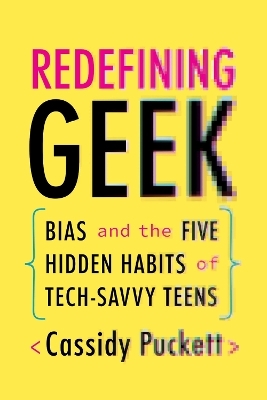
Redefining Geek
Bias and the Five Hidden Habits of Tech-Savvy Teens
Seiten
2022
University of Chicago Press (Verlag)
978-0-226-73269-5 (ISBN)
University of Chicago Press (Verlag)
978-0-226-73269-5 (ISBN)
A surprising and deeply researched look at how everyone can develop tech fluency by focusing on five easily developed learning habits.
Picture a typical computer geek. Likely white, male, and someone you'd say has a "natural instinct" for technology. Yet, after six years teaching technology classes to first-generation, low-income middle school students in Oakland, California, Cassidy Puckett has seen firsthand that being good with technology is not something people are born with-it's something they learn. In Redefining Geek, she overturns the stereotypes around the digitally savvy and identifies the habits that can help everyone cultivate their inner geek.
Drawing on observations and interviews with a diverse group of students around the country, Puckett zeroes in on five technology learning habits that enable tech-savvy teens to learn new technologies: a willingness to try and fail, management of frustration and boredom, use of models, and the abilities to use design logic and identify efficiencies. In Redefining Geek, she shows how to measure and build these habits, and she demonstrates how many teens historically marginalized in STEM are already using these habits and would benefit from recognition for their talent, access to further learning opportunities, and support in career pathways. She argues that if we can develop, recognize, and reward these technological learning habits in all kids-especially girls and historically marginalized racial and ethnic groups-we can address many educational inequities and disparities in STEM.
Revealing how being good with technology is not about natural ability but habit and persistence, Redefining Geek speaks to the ongoing conversation on equity in technology education and argues for a more inclusive technology learning experience for all students.
Picture a typical computer geek. Likely white, male, and someone you'd say has a "natural instinct" for technology. Yet, after six years teaching technology classes to first-generation, low-income middle school students in Oakland, California, Cassidy Puckett has seen firsthand that being good with technology is not something people are born with-it's something they learn. In Redefining Geek, she overturns the stereotypes around the digitally savvy and identifies the habits that can help everyone cultivate their inner geek.
Drawing on observations and interviews with a diverse group of students around the country, Puckett zeroes in on five technology learning habits that enable tech-savvy teens to learn new technologies: a willingness to try and fail, management of frustration and boredom, use of models, and the abilities to use design logic and identify efficiencies. In Redefining Geek, she shows how to measure and build these habits, and she demonstrates how many teens historically marginalized in STEM are already using these habits and would benefit from recognition for their talent, access to further learning opportunities, and support in career pathways. She argues that if we can develop, recognize, and reward these technological learning habits in all kids-especially girls and historically marginalized racial and ethnic groups-we can address many educational inequities and disparities in STEM.
Revealing how being good with technology is not about natural ability but habit and persistence, Redefining Geek speaks to the ongoing conversation on equity in technology education and argues for a more inclusive technology learning experience for all students.
Cassidy Puckett is assistant professor of sociology at Emory University.
Introduction: Why Are Some People So Good with Technology?
Chapter 1. Why Does Digital Inequality Persist?
Chapter 2. What Helps People Learn: Three General Technology Learning Habits
Chapter 3. Techie Tricks: The Two Technology-Specific Habits
Chapter 4. Recognizing the Five Habits: The Digital Adaptability Scale
Chapter 5. The Five Habits, Teens' Futures, and Digital Inequality
Chapter 6. Tackling Digital Inequality: Gatekeepers
Conclusion: Envisioning an Equitable Future
Acknowledgments
Appendix: A Reflection on Mixed-Methods Research
Notes
Index
| Erscheinungsdatum | 30.03.2022 |
|---|---|
| Zusatzinfo | 18 halftones, 10 tables |
| Sprache | englisch |
| Maße | 152 x 229 mm |
| Themenwelt | Schulbuch / Wörterbuch ► Unterrichtsvorbereitung ► Unterrichts-Handreichungen |
| Mathematik / Informatik ► Informatik | |
| Sozialwissenschaften ► Pädagogik ► Didaktik | |
| ISBN-10 | 0-226-73269-X / 022673269X |
| ISBN-13 | 978-0-226-73269-5 / 9780226732695 |
| Zustand | Neuware |
| Informationen gemäß Produktsicherheitsverordnung (GPSR) | |
| Haben Sie eine Frage zum Produkt? |
Mehr entdecken
aus dem Bereich
aus dem Bereich
elektronische Lehrmittel in den modernen Unterricht integrieren
Buch (2024)
Hanser, Carl (Verlag)
CHF 69,95
Grundwissen für Zahntechniker, Band 2
Buch | Softcover (2022)
Neuer Merkur (Verlag)
CHF 61,60
die Zusammenfassung
Buch | Softcover (2023)
Fachwirteverlag
CHF 34,70


